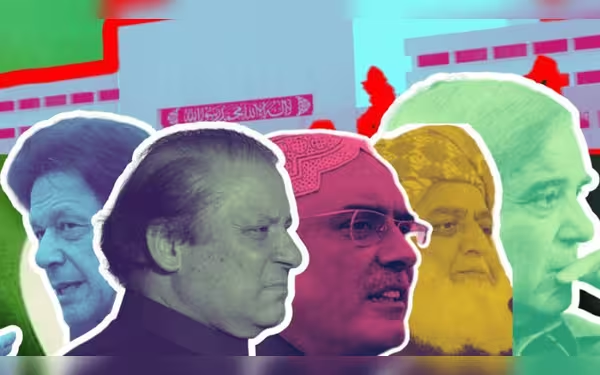Tuesday, July 2, 2024 03:58 PM
Pakistan's Coalition Government Faces Stability Challenges
- Fragmented mandate leads to hung parliament in Pakistan
- Coalition government in Pakistan faces accountability and policy challenges
- Success of Pakistan's coalition government depends on collaboration and common ground
 Image Credits: thefridaytimes
Image Credits: thefridaytimesThe coalition government in Pakistan, formed due to a fragmented mandate, faces challenges such as accountability, policy inconsistencies, and ideological conflicts. Its success hinges on collaboration and finding common ground among participating parties.
Political analysts have highlighted concerns regarding the concept of absolute parliamentary majorities and the challenges they pose. In parliamentary systems, the executive branch's authority is derived from the parliament, which can also remove the executive through a vote of no confidence. When no single party secures a simple majority, coalition governments are formed to accommodate diverse political interests.
In Pakistan, recent elections resulted in a fragmented mandate, leading to a hung parliament and the formation of a coalition government. The coalition, initially led by the Pakistan Muslim League-Nawaz (PML-N), now holds the parliamentary majority. However, concerns have been raised about the stability and effectiveness of this arrangement.
The coalition government in Pakistan faces various challenges, including a lack of accountability, policy inconsistencies, and potential ideological conflicts among participating parties. The distribution of political offices and reluctance to share ministerial responsibilities indicate underlying tensions within the coalition.
Assessing the effectiveness of a coalition government involves examining its lifecycle, from government formation to governance and termination. While the current coalition in Pakistan has completed the initial phase of office distribution, challenges may arise in governance due to differing policy priorities and a lack of shared responsibilities.
As the coalition government navigates these challenges, its ability to address the country's economic and political issues remains uncertain. The durability of the coalition will hinge on the parties' collaboration and their ability to overcome potential policy disagreements.
Coalition governments play a crucial role in accommodating diverse political interests in parliamentary systems. While they offer a platform for shared governance, challenges such as policy inconsistencies and ideological conflicts can impact their effectiveness. In Pakistan's current political landscape, the coalition government faces hurdles that may test its stability and ability to address pressing national issues. The success of the coalition will depend on the parties' willingness to work together and find common ground for the greater good of the country.













